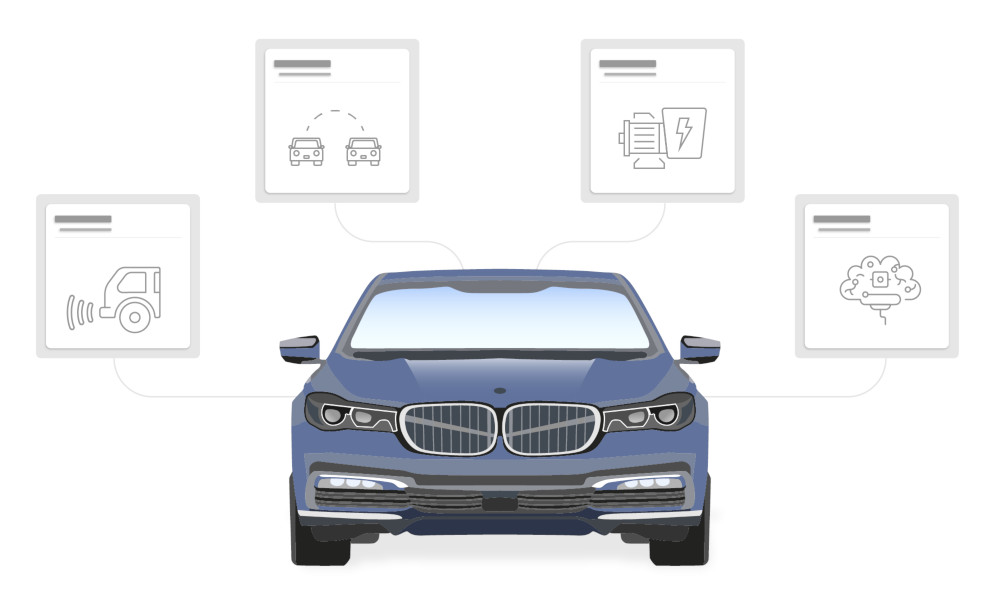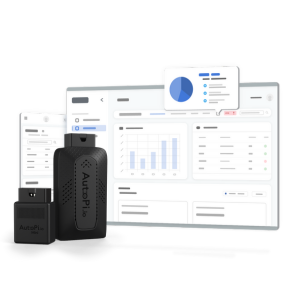Welcome to the world of intelligent car technology. By 2025, an estimated 470 million connected vehicles will be on the roads, revolutionizing driving with AI, IoT, and digitalization. Dive into how these innovations are transforming everyday vehicles into advanced, smart cars.
As technology continues to blend itself into the fabric of our daily lives, we're seeing a remarkable transformation, particularly in the automotive world. The rise of intelligent cars, or "smart vehicles," is not just a futuristic concept anymore - it's a reality reshaping our driving experiences. These cars are more than just machines on wheels; they're like tech-savvy companions, equipped with AI, IoT, and advanced connectivity features.
This shift towards smart vehicles is revolutionizing not only how we drive but also how we interact with our environment on the road. It's an exciting time in the automotive industry, as each new model brings us closer to what once felt like science fiction.
Let's buckle up and delve into this journey of automotive innovation!
What is An Intelligent Car?
An intelligent car, in simple terms, is a vehicle enhanced with advanced technology to provide an unprecedented level of interaction and automation.
Think of it as your regular set of wheels, but with a techy twist that brings it to life. These aren't just cars; they're like your personal co-pilots. They come packed with all sorts of cool features:
-
think smarter navigation that doesn’t just show the way but also predicts traffic jams,
-
cruise control that smartly adjusts to the flow of traffic,
-
and entertainment systems that know just the kind of music you need on a Monday morning.
It's like having a car that doesn’t just take you places but also makes the ride smoother, safer, and way more fun. We’re moving past the era of cars being mere machines; now, they're like smart buddies on the road, ready to make your driving experience a whole lot better.
At the heart of it, an intelligent car is like your vehicle getting a major tech upgrade. It's all about staying connected - with the cloud, with your smartphone, and ultimately, with you. Picture this: adjusting your car's temperature or tracking its location without even being near it, all through your phone. But it's not just your car that's getting smarter; this technology is a big player in bigger ideas like Smart Mobility and even Smart Cities. It's all about making everything on the road work smoother and smarter.
You might think a car is pretty clever if it can squeeze into a parking spot by itself or if it's got a smart touchscreen that looks like it belongs in a spaceship. Sure, these are neat, but they're really just scratching the surface. The truly groundbreaking stuff is what's happening under the hood, with systems that take the car's abilities to a whole new level.
In essence, when we talk about intelligent cars, we're talking about cars that are more in tune, more in the know, and just all-around more capable than anything we've seen before. The automotive world is on the brink of something big, and it's just the beginning. Stick around as we dive deeper into the incredible world of car tech!

Smart Car Technology Essentials for Today's Drivers
Smart car technology dives into the ever-evolving world of high-tech advancements, where the latest innovations are not just shaping our gadgets but also transforming our cars. It's a realm where automotive cybersecurity becomes as crucial as the tech itself, ensuring that our vehicles are safe from digital threats as they get smarter.
So, what's at the heart of these intelligent cars? It's all about smart car technologies. Think of sensors and cameras acting as the car's eyes and ears, GPS systems guiding the way, and a range of devices constantly collecting vehicle data. This data feeds into the car's computer - its 'brain' - controlling everything from steering and acceleration to braking.
Smart vehicle technology isn't just one thing; it's a whole suite of features. Imagine cars chatting with each other (Car-to-Car communication), recognizing your gestures in 3D to control the radio or AC, syncing seamlessly with your smartwatch, or even parking themselves. And yes, they can interact with various apps to make your drive smoother and more connected.
Now, how does all this tech help? For starters, it's making our roads safer by reducing the chances of collisions. It's opening up new ways for people to access transportation - like through Car Sharing - and offering mobility solutions for the elderly and disabled. Plus, these smart vehicles are all about being green, with innovations that boost fuel efficiency and reduce emissions.
But it's not just about the cars themselves. The digital and physical infrastructure, like 5G networks and road designs, also play a huge part. These elements are key to how these vehicles are developed, where they can go, and who gets to benefit from them.

A Simple Look at How Smart Car Works
In our journey through the world of smart car technology, let's take a simple look at how these incredible vehicles work. The rising popularity of smart cars isn't just about their sleek designs; it's the cutting-edge features they pack that make driving a whole lot safer and convenient.
So, how do these smart car features actually work? It all starts with the plethora of sensors and cameras integrated into the car. These aren't just for show; they're constantly collecting data about everything around the vehicle, also known as Automotive Data Loggers.
This data is then sent to the car's computer, which acts as the brain of the operation. The computer processes this information to control the steering, speed, and braking, ensuring everything runs smoothly. For autonomous driving, this data is crucial as it allows the car to make real-time decisions, adapting to changing road conditions and hazards.
Let's take a look at the key elements that make smart cars a revolutionary step in the automotive industry:
-
Advanced Sensors: Smart cars use sensors to detect surroundings, including other vehicles, pedestrians, and road signs.
-
Cameras: Integrated cameras provide real-time visuals, aiding in navigation and safety.
-
Data Processing: The car's computer processes data from sensors and cameras to make driving decisions.
-
Autonomous Driving: Enables the car to drive itself by analyzing road conditions and traffic.
-
Adaptive Cruise Control: Automatically adjusts speed to maintain a safe distance from other cars.
-
GPS and Navigation: Offers precise location tracking and route planning.
-
Connectivity: Links car to smartphones and other devices for remote control and monitoring.
-
Smart Parking: Assists in finding and maneuvering into parking spots.
-
Traffic Prediction: Uses real-time data to avoid congestion and reroute if necessary.
-
Safety Features: Includes automatic emergency braking and lane-keeping assist.
-
In-Car Entertainment: Connects to apps and streaming services for music, news, and more.
-
Eco-Friendly Operation: Electric models reduce emissions and improve fuel efficiency.
-
Car-to-Car Communication: Shares information with other vehicles about traffic and road conditions.
-
Smart City Integration: Interacts with urban infrastructure like smart traffic lights for smoother travel.
What Car Has The Most Smart Technology?
So, let's talk about which car has the most technology of them all. When it comes to cars packed with smart technology, a few names really stand out. These aren't just cars; they're like rolling tech showcases:
-
Tesla Model X:
-
Known for its futuristic design, including falcon-wing doors.
-
All-electric SUV with impressive acceleration.
-
Equipped with Autopilot for advanced driving assistance.
-
Large, intuitive infotainment system and high-tech cabin features.
-
-
Mercedes-Benz S-Class:
-
Offers a luxurious driving experience.
-
Advanced adaptive suspension for ultimate comfort.
-
Massaging seats and top-tier driver assistance tech.
-
Cutting-edge infotainment and connectivity options.
-
-
Audi A8
-
Synonymous with luxury and advanced technology.
-
Features like adaptive suspension for a smooth ride.
-
High-end interior with sophisticated driver assistance systems.
-
Combines elegance with technological innovation.
-
-
BMW 7 Series:
-
A blend of luxury, power, and high-tech features.
-
Powerful engines with an advanced, tech-rich interior.
-
Smart voice and gesture control systems.
-
Balances comfort with performance.
-
-
Porsche Taycan:
-
Represents the future of electric sports cars.
-
Exceptional acceleration and handling.
-
Advanced electric powertrain and driver assistance technologies.
-
High-tech infotainment system and connectivity.
-
As for the car currently leading the pack in smart technology 2023:
-
Mercedes-Benz EQS:
-
The pinnacle of electric luxury sedans.
-
Features the revolutionary MBUX Hyperscreen, an entire dashboard turned into a touchscreen.
-
Advanced autonomous driving capabilities.
-
Innovative energy efficiency and range, setting new standards in the EV market.
-
Packed with luxury amenities, advanced safety features, and next-generation connectivity.
So, what sets these vehicles apart? It's their unique blend of innovation, performance, and luxury. They're not just about getting you from A to B; they're about making that journey as enjoyable, safe, and smooth as possible. They're the kind of cars that don't just have smart technology; they are smart technology.
Whether it's navigating through traffic, providing entertainment, or just making sure you're as comfortable as possible, these cars are at the forefront of what it means to be a 'smart car.' So, if you're looking for a ride that's as brainy as it is beautiful, you might want to check these models out. They're redefining what it means to drive in the modern world.
How To Upgrade Car Intelligent System With Telematics
When it comes to upgrading your car's intelligent system, telematics is a powerful tool that can significantly enhance your vehicle's capabilities. A prime example of this technology is the AutoPi Telematics Unit, used in conjunction with the AutoPi Cloud. Let's explore how you can upgrade your car's intelligent system using these tools.
Disclaimer: It's important to note that upgrading your car with telematics, especially using systems like AutoPi, isn't a simple plug-and-play operation. It requires a certain level of technological knowledge and understanding of your vehicle's systems.
-
Understand Your Needs: Before diving into any upgrade, assess what you want to achieve. Are you looking for better tracking, improved safety features, or enhanced performance data? Knowing your goals will guide your upgrade process.
-
Acquire the AutoPi Telematics Unit: This device is a crucial component for upgrading your car. It connects to the OBD-II (On-Board Diagnostics) port of your vehicle and serves as the gateway for data transmission. Locate your OBD-II port here.
-
Familiarize Yourself with AutoPi Cloud: This cloud-based platform is where the magic happens. It's where you can analyze and interpret the data collected by the AutoPi unit. Spend some time understanding its interface and features. Contact us to get FREE access.
-
Installation: Carefully install the AutoPi Telematics Unit into your car's OBD-II port. Make sure you follow the manufacturer's instructions to avoid any mishaps. Follow our Getting Started Guide.
-
Configuration and Customization: Connect the AutoPi unit to the AutoPi Cloud. Here, you'll configure settings and customize features according to your needs. This step is where your technological know-how is crucial.
-
Testing and Calibration: After installation and configuration, test the system to ensure it's functioning correctly. You might need to calibrate certain features to align with your car's specifics.
-
Regular Updates and Maintenance: Keep your system updated with the latest software releases from AutoPi. Regular maintenance checks are also essential to ensure long-term functionality.
Upgrading your car's intelligent system with telematics can unlock a new level of connectivity and data-driven insights. While the AutoPi Telematics Unit and AutoPi Cloud offer robust solutions, it's essential to approach this upgrade with the necessary knowledge and caution to ensure a successful enhancement of your vehicle's capabilities.






